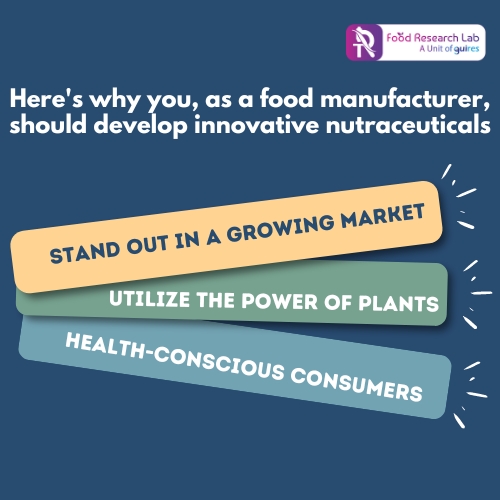
Developing Focused & Innovative Nutraceuticals for Healthy Diabetes Management
Diabetes mellitus stands as a formidable challenge within the realm of non-communicable diseases, exerting a significant strain on global healthcare systems. The statistics paint a stark picture: in 2017, approximately 425 million individuals of reproductive age worldwide grappled with this condition. Fast forward to 2021, and that number has surged to 536.6 million adults aged 20 to 79 years, with projections indicating a staggering 643 million by 2030 and a daunting 783.2 million by 2045. This exponential rise emphasizes the urgent need for effective interventions to address the escalating prevalence of diabetes mellitus.
Developing Focused & Innovative Nutraceuticals for Healthy Diabetes Management
Introduction
Diabetes mellitus stands as a formidable challenge within the realm of non-communicable diseases, exerting a significant strain on global healthcare systems. The statistics paint a stark picture: in 2017, approximately 425 million individuals of reproductive age worldwide grappled with this condition. Fast forward to 2021, and that number has surged to 536.6 million adults aged 20 to 79 years, with projections indicating a staggering 643 million by 2030 and a daunting 783.2 million by 2045. This exponential rise emphasizes the urgent need for effective interventions to address the escalating prevalence of diabetes mellitus.
Understanding the multifaceted risk factors associated with diabetes mellitus is crucial for devising comprehensive prevention and management strategies. Factors such as increasing age, male gender, family history of diabetes mellitus, low CD4 count, and elevated body mass index (BMI) contribute to the heightened risk of developing diabetes mellitus.[2]
Amidst this challenging landscape, the concept of nutraceuticals emerges as a beacon of hope. Derived from the fusion of “nutrition” and “pharmaceutics,” nutraceuticals encompass a diverse array of products ranging from herbal extracts to dietary supplements and processed foods imbued with medicinal properties.
Nutraceutical products are regulated as drugs, food ingredients, and dietary supplements, highlighting their versatile nature and potential for addressing various health concerns. For food manufacturing companies, this presents a compelling opportunity to harness the power of nutraceuticals in combatting diabetes mellitus. By developing innovative products tailored to the needs of diabetic individuals, food and nutraceutical manufacturing company can not only contribute to public health initiatives but also fill the gap in the booming nutraceutical market with science-backed solutions for specific health concerns.
Understanding the Diabetes Epidemic
Diabetes mellitus, often referred to as a “sugar” disease, represents a chronic disorder affecting the metabolism of carbohydrates, fats, and proteins. At its core lies a defective or deficient response in insulin secretion, leading to impaired utilization of glucose—a hallmark characteristic of diabetes mellitus. As the global prevalence of this condition continues to climb at an alarming rate, reaching an estimated 536.6 million adults in 2021, the need for innovative treatment solutions has never been more pressing.[1]

The burden of diabetes mellitus extends far beyond mere statistics, encompassing a myriad of complications that can significantly impact quality of life and pose serious threats to health. From progressive retinopathy leading to potential blindness, nephropathy culminating in renal failure, to neuropathy predisposing individuals to foot ulcers and autonomic dysfunction—the long-term effects of diabetes mellitus are profound and far-reaching. Moreover, individuals with diabetes face an increased risk of developing cardiovascular disease, further compounding the complexity of managing this condition.[7]
For food manufacturing companies in the United States, the imperative to address the rising tide of diabetes mellitus is clear. As the demand for effective treatment options continues to escalate, there exists a prime opportunity for industry leaders to leverage their expertise in product development and formulation to create innovative and natural solutions tailored to the unique needs of diabetic individuals. With the increasing prevalence of side effects caused by diabetic medication, consumers are increasingly interested in natural alternatives that avoid unwanted reactions. This is where nutraceuticals step in as significant players. From functional foods enriched with bioactive compounds to specialized dietary supplements designed to support metabolic health, the potential for food-based interventions in diabetes management is vast and promising.
The Role of Nutraceuticals in Diabetes Management
Nutraceuticals are recognized as medications due to their potential for treating, curing, or mitigating medical conditions and restoring physiological functioning. This broad classification encompasses a diverse range of products, including isolated nutrients, herbal items, dietary supplements, and processed goods like cereals and beverages, as well as genetically engineered designer foods. Nutraceuticals find application in addressing various health concerns, ranging from arthritis and digestive issues to cancer prevention and cardiovascular health. They offer several advantages, including minimal to no side effects, enhanced health benefits, natural dietary supplementation, and economic affordability, making them easily accessible to consumers.
Classification of nutraceuticals includes functional foods, carotenoids, collagen hydrolysate, dietary fibers, fatty acids, phytochemicals, herbs, probiotics, and dietary supplements. Each category serves distinct therapeutic purposes, such as providing essential nutrients, antioxidative properties, immune system support, and digestive health enhancement.[3]
A myriad of nutraceuticals have emerged as promising adjuncts in the management of type 2 diabetes mellitus (T2DM), the predominant form of diabetes worldwide, which is often correlated with obesity. Despite the introduction of numerous pharmaceutical interventions, the global prevalence of diabetes continues to escalate, imposing significant economic burdens on both individuals and society.
We have the experience, knowledge and Nutraceutical portfolio to help you develop
Interested in learn more? Get in touch, we’d love to discuss your next project with you
A diverse array of nutraceuticals and their mechanisms of action have been elucidated to address the multifaceted challenges of diabetes mellitus.
- Aloe Vera: boasts polysaccharides, anthraquinones, and lectins with anti-diabetic properties. Its gel, when ingested, may activate pancreatic β-cells, thereby exerting hypoglycemic effects.
- Garlic (Allium sativum): Garlic, harbors sulfur compounds contributing to its medicinal properties. Among its plethora of benefits, garlic demonstrates anti-hyperglycemic effects through enhanced insulin sensitivity and secretion, along with improved glucose uptake.
- Turmeric (Curcuma longa): Renowned for its anti-inflammatory and antioxidant properties, turmeric’s curcuminoids exhibit promising anti-diabetic effects. Numerous studies have indicated that curcumin is a very potent antimicrobial agent and is active against various chronic diseases, including diabetes. Turmeric influences insulin secretion and signaling pathways, offering potential in glycemic control and insulin resistance management.[2]
- Ginger (Zingiber officinale): Zingiber officinale, showcases anti-inflammatory and antioxidant activities. Ginger modulates insulin signaling pathways, enhances glucose uptake, and guards against diabetic complications such as retinopathy and neuropathy.
- Cinnamon: Cinnamon shows promise as a natural remedy for regulating blood glucose levels. Studies suggest that the oral administration of cinnamon extracts can have significant nutraceutical effects on blood glucose levels through multiple metabolic pathways. [4]
- Saffron: Saffron, presents opportunities for improved diabetes management and oxidative stress reduction. Its mechanisms of action include glucose uptake stimulation and inhibition of intestinal glucose absorption, suggesting promise as a novel treatment strategy.
- Fenugreek: A member of the Fabaceae family, fenugreek exhibits antioxidant, anti-inflammatory, and anti-diabetic properties. Its active compounds, including galactomannan and saponin, contribute to improved insulin sensitivity and glucose absorption.[6]
The Need for Nutraceutical Innovation in Diabetes
The increasing rates of diabetes are a major public health concern. But within this challenge lies a tremendous opportunity for food manufacturers to be at the forefront of a nutritional revolution. Imagine a future where your food products don’t just fill bellies, but actively contribute to better health. By developing innovative nutraceutical solutions for diabetes management, food manufacturers can lead the market.
Here’s why you, as a food manufacturer, should develop innovative nutraceuticals:
- Stand Out in a Growing Market: Diabetes affects people differently, and the demand for personalized solutions is booming. Partnering with a food development outsourcing company can help you develop a diverse range of nutraceutical products catering to specific needs. This sets you apart from the “one-size-fits-all” approach.
- Utilize the Power of Plants: Cutting-edge research is revealing the potential of plant-derived nutraceuticals for diabetes management. You can collaborate with a new product development contract R&D Lab and can leverage this science and integrate these ingredients into your existing products – functional foods, supplements, or even processed goods. This allows you to offer consumers the natural and effective solutions they’re seeking.
- Tap into Health-Conscious Consumers: Today’s consumers are more health-conscious than ever, looking for holistic approaches to wellness. By subtly highlighting the potential health benefits of your nutraceutical-infused products, you’ll resonate with this growing market segment.
Partnering with Guires Food Research Lab gives you access to:
- Expert Knowledge: We stay on top of the latest research and ingredient science in nutraceuticals for diabetes.
- Fast-Track Innovation: Get to market quickly with our expertise in developing innovative and effective nutraceutical food products.
- Reduced Risk: We handle the complexities of research and development, minimizing your risk and maximizing your return on investment.
Don’t miss out on the chance to make a real difference in public health! Contact us today to discuss how we can help you unlock this exciting opportunity.
Conclusion
The global diabetes epidemic calls for proactive solutions, and the potential of nutraceuticals within the food industry presents a beacon of hope. This is where food manufacturers can make a significant impact. Partnering with a nutraceutical formulation outsourcing company allows you to tap into expert knowledge, accelerate innovation, and minimize risks while maximizing potential rewards.
Together, we can create a future where food goes beyond mere sustenance – it becomes a powerful tool for promoting well-being and managing chronic health conditions like diabetes. Let’s embrace this opportunity to shape a healthier future, one delicious and functional bite at a time.






